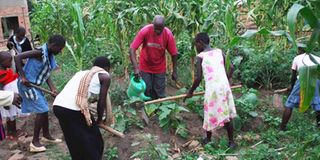Children's right to food is the reason to teach them farming

An irrigation system helps retain nutrients in the soil as well as improve the yield.
For Yisito Kayinga Muddu, teaching children to grow their own food is a human rights issue. “Young children must be well fed to grow well,” he says. “They have a right to food.” He is the director and founder of Community Transformation Foundation Network (Cotefone), a local NGO based in Kiwangala Trading Centre in Lwengo District. It takes care of vulnerable children, mainly those orphaned by HIV/Aids.
Farming lessons
“But they must also be helped to appreciate that land is a source of food and wealth. Most of the children under my care have some land, left behind by their departed parents. For me, it is just a question of helping them to make use of that land to become self reliant as they grow older,” he says. His school has a garden where every school day the children spend about an hour learning to grow crops such as beans, maize, sweet potatoes and vegetables.
“We insist that they apply modern farming skills and we encourage them to bring seeds to plant in the school garden,” adds John Ssentongo, an elder in the area and a farmer, who teaches them modern methods of farming.
Legal services
Muddu plans to start a Child Aid Legal Protection Unit in partnership with Makerere University, to provide free legal services to orphan and other vulnerable children whose land and other property is stolen by relatives who take advantage of ignorance of their rights. “When their land is stolen, they have nowhere to practice the farming skills we provide them when they are with us,” he reasons.




